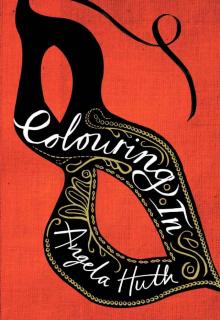- Home
- Angela Huth
Such Visitors Page 3
Such Visitors Read online
Page 3
By the time Lola left it was almost dark. She claimed she had to be somewhere far away by six, and must hurry. From his first-floor window Gerald watched her run down the front path. She left large foot-prints in the new snow – it must have fallen during the afternoon. Funny they hadn’t noticed it. Rubbing his elbow, Gerald wondered where she was going. He turned back to the fallen piles of books. Attempting to restore some order, he tried not to think. The evening ahead seemed long and empty. The warmth of the room, always to be relied on, had gone with Lola. The thief, he thought. The impudent thief. He wouldn’t let her go, next time.
There followed a week of absence. Lola was away on some secret mission. But she rang, as promised, on her return – within half an hour of her return, as a matter of fact, Gerald noticed. She asked him to supper next evening. Just a stew, she said, and Rose might drop in.
Gerald spent a day of happy anticipation, enjoying the patience that comes with knowing there are only a few hours to pass. He tried to get used to the strange sensation that in time he and Lola might become proper friends. He bought two expensive bottles of wine, one white, one red, and rather hoped Lola would be alone.
But Rose was already there, peeling potatoes, exuding an air of efficiency that Lola altogether lacked. She was small and curvaceous, with pale wavy hair that kept falling about her face, changing its shape from moment to moment. She had vast yellow-green eyes that slanted cat-like, and one dimple when she smiled. The warmth of her was so powerful that for a moment Gerald saw Lola as a cold and distant mountain. Then the mountain laughed in absolute delight at his extravagant wine, and his lonely week without her turned to dust.
Over dinner in the small, hard kitchen with its dreadful strip lighting and vegetable-patterned curtains, Gerald learned that Rose and Lola were childhood friends. They had been brought up together in Dorset, gone to school together, shared a love of sport and (much laughter in recalling the incidents) even a boyfriend in their teens. They still met at least once a week and, Gerald supposed, confided to each other the intimate secrets of their hearts in that peculiar way that girls seem unable to resist. They spoke of their sporting life, of course, praising each other’s qualities of stamina and speed.
‘Rose can run miles and miles without getting out of breath,’ explained Lola. ‘She always won the cross-country at school. There was no one to touch her.’
‘Ah, but Lola’s high jump,’ declared Rose. ‘That was something. She broke all records.’
Gerald enjoyed the evening. The girls, chattering on almost as if he was not there, made him relax and smile. Having drunk most of the excellent wine himself, and having been persuaded to eat far too much of the heavy stew, a delightful sleepiness came upon him. Lola and Rose, immersed in their memories, didn’t seem to notice his drooping eyelids. He could watch them unobserved. With some incredulity he reflected how only ten days ago there was no woman in his life with whom he could have wanted to spend the evening. Now here he was enjoying himself with two new ones, relishing their quite different attractions, and their friendliness. It was not the night, however – as during the afternoon he had vaguely thought it might be – to lay a gentle hand on Lola. For some reason, he would not want Rose to know any such thoughts had crossed his mind. And were he not to leave before Lola, Rose would be bound to guess his intentions.
So he left early, mumbling about an early start next morning. The girls were dismayed, but understanding. They both kissed him warmly on the cheek.
In his chilly bed, two hours later, Gerald was still thinking about them: Rose’s eyes, Lola’s smile; Rose’s waist, Lola’s full bosom. Both had rippling laughs, soft voices. Forced to choose between them, though, Lola would be his. She had a rare quality of calm, for all her mischievous fun, that gave him strength. Besides that, she was a creature of extraordinary sensitivity: in the laughing discussion they had had about judo she had given Gerald a look but made no mention of the event that proved her skills had not rusted. Gerald would always be grateful to her for that. Lola, Lola, Lola, he said to himself: it’s a cold night without you.
Then he heard the ring of his front door bell. He hurried downstairs, puzzled. He was not a man on whom unannounced visitors eagerly called. Something must be wrong. Gerald felt the excitement of fear.
Rose, muffled in a fur coat, stood on his doorstep. She held out his grey wool scarf.
‘You left this behind … Sorry. Have I woken you? Thought I’d drop it in as I was passing.’
‘Good heavens. No. Yes. I mean, well – look, do come in. Afraid I’m in my pyjamas.’
‘Are you sure?’ Rose was already in the hall, snowflakes on the fur glinting in the dim light.
“Course. We’ll have some whisky.’
He put on his dressing-gown, she kept on her coat. They sat on the floor by the gas fire, listening to its quiet buzz, aware of the full moon through the window.
‘Sorry it’s so cold,’ said Gerald. ‘I keep meaning to put in central heating, but can’t face all the palaver.’
‘That’s all right.’ Rose shivered and smiled. ‘That was the most heavenly evening, wasn’t it? I can’t think why, but I know I’ll remember it as a particularly nice evening. Won’t you?’
‘Yes,’ said Gerald. ‘Think I probably will.’
‘Lola says you’ve only met twice.’
‘That’s right.’
‘She’s the best person, actually, I’ve ever met.’
‘Ah,’ said Gerald. ‘I can see she seems a … good sort.’
Rose laughed. ‘What do you mean, a good sort? I’ve never heard anything so pompous.’
In the fraction of the second that her eyes were closed with laughter, Gerald flung himself awkwardly against her, pushing her flat on to the floor. He kissed her with all the hunger that had been pent within him, festering, for two years. She wriggled furrily beneath him, murmuring something about knowing the moment she saw him it would end like this.
‘But can’t we go somewhere more comfortable?’ she said. They spent the night in Gerald’s bed.
Rose stayed three nights and three days. During that time she tidied Gerald’s flat, changed the sheets and bath towels, brightened the place with Christmas roses and winter leaves. Gerald would come back in the evening and find her cooking casseroles that smelt of past holidays in the South of France, a butcher’s apron belted tightly round her tiny waist. Each evening he found himself unable to wait for the pleasure of her until after dinner, and later at night he would fall deeply asleep in her arms.
On the fourth morning she announced she had better be getting back to her flat. Gerald, whose reasoning was never its liveliest at breakfast, struggled with himself. He reflected on the speed with which a man can turn from solitude to cohabitation, and with what ease the new state of living together can feel like an old habit. He thought of asking her to stay, to live with him for a while. But she had already packed the small case she had fetched from her flat. She was washing the breakfast things with an air of finality. An invitation to stay, at that moment, would have seemed presumptuous. So Gerald let her go, all smiles and thanks for the happy time, anticipating a welcome return to his solitary state.
But when he got back to the flat that evening, still smelling slightly of Rose’s scent, the breakfast things where she had left them tidily on the table, aloneness seemed less desirable.
He lit the fire, whose hiss had become confoundedly nostalgic, and a small cigar. He poured himself a drink and tried to concentrate on his briefs for the complicated case next day. But there was no heart in his concentration, no appetite for the cold food Rose had thoughtfully left in the fridge. Damn the girl. He found himself humming a tune from a musical of twenty years ago. At the age he had seen it the words had held no meaning for him: I was serenely independent/And content before we met…
And he would be again, given a few days. It was not as if he had wanted her, or any woman, to insinuate herself into his well-structured life. In so many years of bachelordom he had learned th
e art of subtle evasion and self-protection. Rose had merely stirred some superficial desire in him, vulnerable after two years’ chastity.
All the same, by nine o’clock he decided to ring her and tell her to come back. Just to talk. As he moved to the telephone, hesistant in the knowledge of his weakness, it rang. Rose, then, was even weaker than he: Gerald was glad.
‘For Christ’s sake, come back quickly,’ he said, no time to think of more reticent words.
‘Come back? It’s Lola, not Rose.’
‘Lola? I’m sorry. How nice.’ He had almost forgotten her in the last few days.
‘Rose has had to go home to Yorkshire to nurse her mother who’s dying of cancer.’
‘Oh. I’m sorry. I wonder she didn’t tell me herself.’
‘She thought about it, but decided the news would be inappropriate during the last few days.’
Gerald silently marvelled at Rose’s sensitivity.
‘It might have made a difference,’ he agreed.
‘I mean, one doesn’t want to burden new friends with serious problems, does one?’ There was remarkable lightness in Lola’s voice.
‘No, of course not. Look here … What are you doing? Why don’t you come round for a drink?’
The invitation was a reflex action. Having heard himself make the fatal suggestion, Gerald suddenly relished the idea of instant, innocent infidelity. Lola could tell him more of Rose, of her dying mother. Lola, platonic Lola, Rose’s friend … All parties would understand.
‘I just might,’ said Lola with maddening cool. ‘I’ll see how I feel.’
She arrived two hours later, took her customary position on the floor as if she had never been away. The room was full again. Gerald poured glasses of wine. Almost at once Lola broke the news.
‘Rose loves you,’ she said. ‘Exceedingly.’
Gerald raised an eyebrow. He reflected with some wonder on the swiftness of communication between women friends. Lola was smiling, sympathetic.
‘Oh yes,’ she was saying. ‘Rose hasn’t been so bowled over for years. Ever, perhaps. I had a feeling, didn’t I, you two would get on together?’
‘I remember.’ Gerald sat down, rather enjoying himself. He wouldn’t have minded hearing more. He searched for some way to convey his own modest feelings about the whole matter.
‘Isn’t she being a little … precipitate?’ he asked. Perhaps he should have said rash, daft, or infatuated.
‘Good heavens, no. How unromantic you are. I mean, you just know some things immediately, don’t you?’
Gerald, who was always unsure of his initial reactions, had not the heart to disagree. ‘Perhaps,’ he said, feebly. ‘But she indicated nothing of this to me, though she was very kind.’ He glanced round the room at the neat piles of books, the vases of flowers. ‘She kept you in touch with activities, did she?’
‘Oh, we tell each other everything. Always have. That’s why I didn’t ring, knowing she was here.’
It might have been Gerald’s imagination, due to the lateness of the hour, but he detected the slightest falter in this explanation of her silence. Lola now lowered her eyes.
‘She told me you were potentially marvellous in bed, if a bit out of practice, and wonderfully considerate in most other ways.’
‘Did she indeed?’ Pride mixed with fury rose within Gerald. Was there no such thing as a discreet woman? A woman who had some respect for private moments?
Struggling for control, he murmured, ‘I’m forced to believe that events can only be confirmed in a woman’s mind by reporting them. A man has faith in his own private reflections, memories. They can be real to him alone. That seems to me the essential difference between the sexes.’
‘Are you cross?’ Lola looked at him. Such innocence.
‘Cross? Not cross at all. Flattered, perhaps, I should have been the subject of your talk.’
He bent forward, stretched a hand to the back of Lola’s neck. Had she not been Rose’s friend he would have ravished her on the spot. As it was, her quiet presence filled him with a nameless longing that the past days and nights with Rose had done nothing to dispel.
‘Rose,’ said Lola, apparently unaware of his hand, ‘is the most remarkable girl I know.’
‘That’s just what she said about you.’
‘Oh, we’re very loyal.’ Lola gently removed his hand. ‘Poor Rose. Her mother’s been a burden one way and another all her life.’
‘Will she be long dying?’
‘She might be.’ Lola lowered her eyelids again.
‘In that case …’
‘For heaven’s sake, don’t make some crappy suggestion about consoling each other while she’s away.’
‘Of course not.’ The sharpness of Lola’s tone suggested to Gerald it was time he became master. Against all instinct he stood up. ‘I think you’d better go,’ he said. ‘I’ve a hard day tomorrow.’
‘I’m sorry,’ said Lola. For a split second she screwed up her eyes, disguising an almost discernible look of pain. She rose to her feet. ‘I won’t keep you. You must be exhausted.’
Gerald followed her to the front door, head bowed. His attempted brusqueness, meant to conceal his own temptation, had misfired. He had hurt, inadvertently, where he had meant merely to warn: to indicate he was a man of high principle where friends were concerned.
‘I’ll ring you,’ he said gloomily.
‘Oh, if you feel like it.’
Lola ran down the path into yet more spinning snow. Back in his room, Gerald had two more drinks to induce sleep, and to clear his mind. Eventually, dawn paling the snowy windows, he fell asleep, a confused man. The images of two girls raced behind his eyes – sharply, at first, figures from memory. Gradually, they dissolved into the stuff of dreams: interchanged, beckoned, laughed, teased, and faded when he touched them.
Days went by. A card came from Yorkshire.
This business may take some weeks, wrote Rose. Please don’t quite forget me.
Gerald wondered if her echoing of Katharine Mansfield’s dying words had been intentional.
I won’t, he wrote back. Memory of your presence lives uncomfortably in my flat.
He was unsure whether that was the whole truth, the explanation for his restlessness. But he posted the card and rang Lola. Her silence was frustrating. Her evident pleasure, on hearing him, was cheering.
He drove her to Hungerford, on Sunday, for lunch at The Bear. She, like Rose, had a fur coat: older, softer. She refused to take it off till halfway through lunch.
‘But I thought you never felt the cold,’ said Gerald.
‘I did today.’ She sounded sad, struggled reluctantly out of its arms. Beneath it she wore an apricot silk shirt. Gathers from a deep yoke swelled over her breasts. Gerald swore he could see one of them moving, thumped by her heart. He wanted to touch it. Instead he dug into his treacle tart, eyes down, not daring to look further.
‘Rose misses you dreadfully,’ Lola was saying. ‘She rings me up most evenings to ask how you are. I keep telling her I don’t know, I don’t see you. She keeps saying, Do see him, and let me have some news. That’s why I came today, so that I can report back.’
‘Oh.’
Gerald allowed himself the merest glance at Lola’s hazel eyes, the long thick lashes cast down to indicate her seriousness.
‘I suppose I shouldn’t be telling you all this.’
‘Probably not.’
‘Do you love her?’
‘Love her?’ Gerald was thinking about the middle-aged couple at the next table. What had induced the woman, dressing that morning, to choose a pink velour hat, manacled by brown feathers, for a December lunch in Hungerford? ‘Love her?’ he repeated. ‘Well, I like to think the onset of real love, when it comes, is quite clear. For the moment, I’m confused by Rose, so that can’t mean love.’
‘But I suppose that means some hope,’ said Lola. ‘I suppose that means some reason for optimism on Rose’s part.’ She smiled enchantingly. ‘I mean, confus
ion could always broaden out into absolute clarity, couldn’t it?’
‘I suppose it could,’ said Gerald, not wanting to disappoint her. Then he suggested large brandies against the cold of the afternoon.
They walked on the Downs making tracks through the snow. Each kept their hands deep in their pockets. The sky, thick with more approaching snow, was broken on the horizon by zests of yellow cloud. Gerald, surprising himself, flung his greatcoat on to the ground. It made a strange patch of colour on all the white.
‘God couldn’t find any matching material,’ giggled Lola, voicing succinctly the vaguely similar thoughts he had been having himself. He watched as Lola lowered herself on to the coat, gathering her long legs under her arms. She was protected by a hedge of snow a few inches high. She looked up at him, concerned. ‘Aren’t you cold?’
The wintry chill seeped through Gerald’s tweed coat, a strange pleasure.
‘Not at all.’ He sat down beside her.
‘As a matter of fact, there’s nothing more elusive than clarity,’ she was saying.
Again, Gerald’s own thoughts: though he felt it would be feeble to agree out loud. He moved his eyes from the valley beneath them, the black-boned trees softened by the distance, to Lola’s flushed face. He felt his way beneath her fur coat, beneath the warm silk of her shirt. The sky crushed down low over their heads. Gerald was surprised to find his hand suddenly on a bare thigh, pinned there by flakes of snow. He felt them melting, the water trickling between his fingers. Lola gave a shriek as it reached her flesh. There was a small thread of sound from a distant train. The bellow from an invisible cow, startling.
‘This isn’t right,’ said Lola. But she lay back, eyes shut, snow covering her so quickly Gerald was forced to move himself on top of her to protect her from the thickening flakes.
They returned to The Bear for tea. Lola was ravenously hungry. The lady with the feathered hat sat drowsily by the fire, cup of tea in pink hand, exhausted by the indolence of her afternoon. Her companion, a small grey-flannel man, pecked at a pipe, staring at some private distance. At the sight of Gerald and Lola he looked for a moment quite shocked, as if something about them caused painful nostalgia. He tapped his pipe so savagely on the hearth that the fat lady murmured, ‘Whatever is it, dear?’

 Sun Child
Sun Child South of the Lights
South of the Lights Virginia Fly is Drowning
Virginia Fly is Drowning Of Love and Slaughter
Of Love and Slaughter Such Visitors
Such Visitors Once a Land Girl
Once a Land Girl Land Girls
Land Girls Colouring In
Colouring In Nowhere Girl
Nowhere Girl Monday Lunch in Fairyland and Other Stories
Monday Lunch in Fairyland and Other Stories Another Kind of Cinderella and Other Stories
Another Kind of Cinderella and Other Stories Invitation to the Married Life
Invitation to the Married Life Easy Silence
Easy Silence